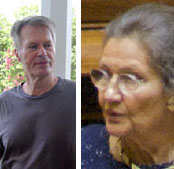Jean-Marie Gustave Le Clézio marked the year 2008 by receiving the most prestigious of awards: the Nobel Prize in Literature. The general public only came to know and acclaim this native son with the publication of his first work, “Le Procès-verbal.” In the 1970s, his writings bore the stamp of the “nouveau roman,” a literary movement that would precede the famous cinematic “Nouvelle Vague” and, like it, reject the classicism of his peers. His writings find their origins in one of the darkest chapters of human history, the Second World War. Born in Nice on April 13, 1940, he did not witness the battles, but his mind remains forever marked. “If I examine the circumstances that led me to write […] I can clearly see that at the start of it all, for me, there is the war.” He wrote his first words “on the backs of ration books, using a blue and red carpenter’s pencil.” But “for lack of children’s books, I read my grandmother’s dictionaries.”
Simone Veil is certainly the most well-known Niçoise worldwide. A distinguished ambassador for the people of the Côte d’Azur, she served as Minister of Health, President of the European Parliament, Minister of Social Affairs, and Member of the Constitutional Council. In 2008, still in the spotlight, she was tasked in January with leading “a great national debate to define the new fundamental principles necessary for our time” and “to inscribe them in the Preamble of the Constitution” according to the head of state. Honorary president of the Foundation for the Memory of the Shoah, she opposed Nicolas Sarkozy in February 2008, challenging his plan to assign the memory of a Jewish child from France, who died during the Holocaust, to each CM2 student. In March 1944, it was in Nice that Simone Veil, whose real name was Simone Jacob, was arrested by two SS soldiers. Deported with her mother and one of her sisters to the Auschwitz-Birkenau concentration camp, she would be among the few survivors. Since November 2008, Simone Veil has been a member of the Académie française.


